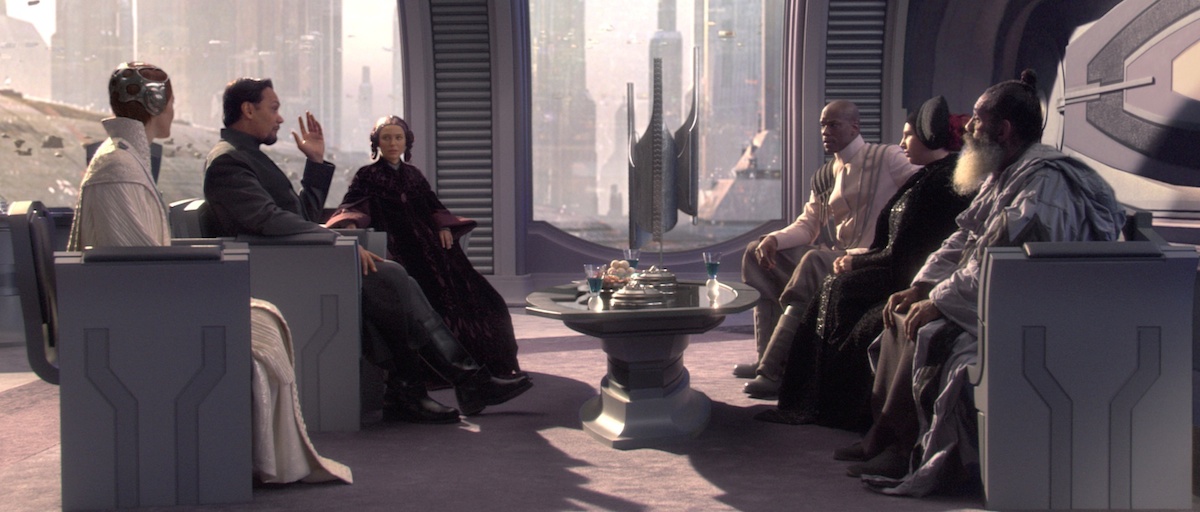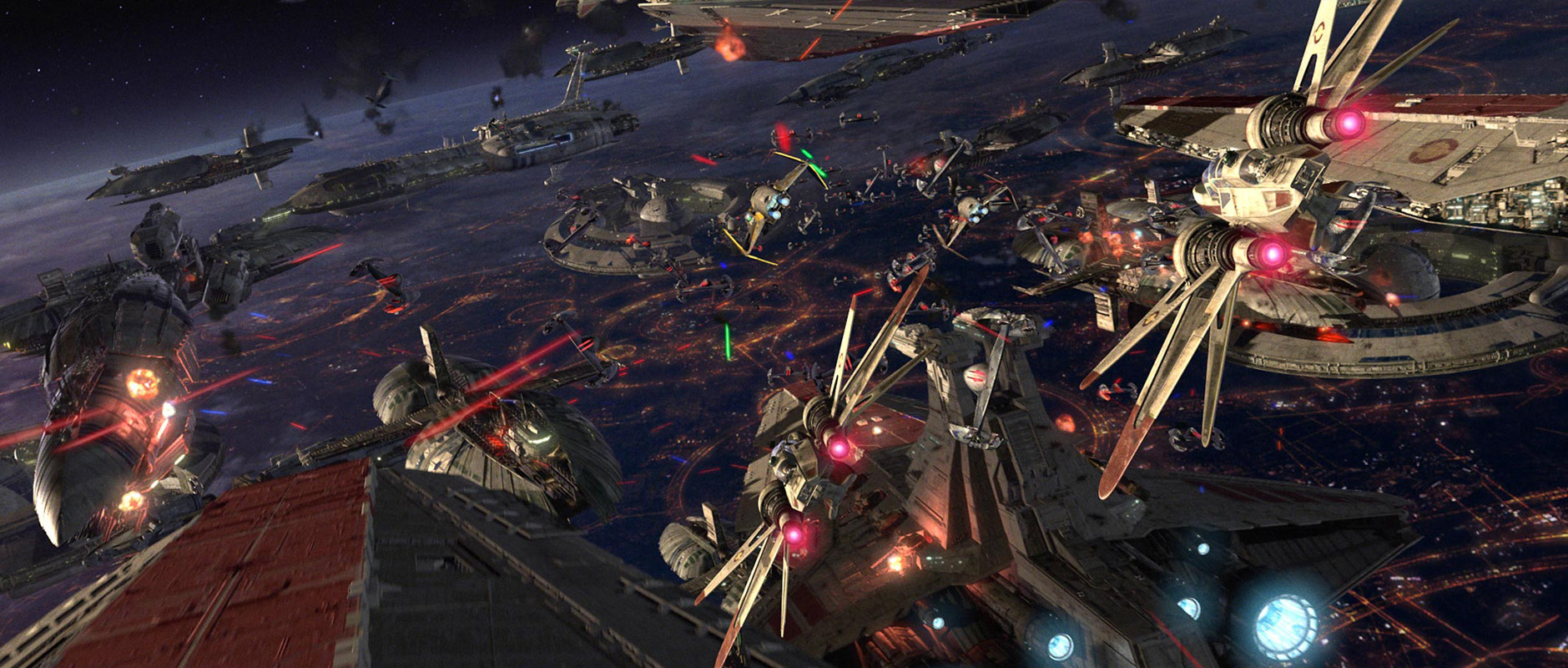In the year 19 BBY, within the continuity of Legends, Supreme Chancellor Palpatine delivered his State of the Republic address. This momentous occasion took place before a specially convened meeting of the Senate belonging to the Galactic Republic. Given that the address was given during the third year of the galaxy-spanning Clone Wars – a conflict pitting the Republic against the Separatist Confederacy of Independent Systems – its primary focus rested on the war's progression and the Chancellor's strategic vision for the battles to come. Despite growing dissent from Loyalist senators, Palpatine used his speech to justify the continuation of the war, with particular attention paid to the Outer Rim Sieges and the threat posed by Confederate forces still active in the targeted territories. The Supreme Chancellor, however, also aimed to instill a sense of optimism within the Republic's populace, highlighting the successes in driving the Separatist Droid Army from numerous Republic-held areas.
Many of the Chancellor's Senate colleagues responded to his State of the Republic address with enthusiastic support, largely agreeing with his decision to continue the war. However, the Jedi High Council and members of Senator Bail Prestor Organa's anti-war faction from Alderaan were among the dissenting voices who opposed Palpatine's strategies. Following the address, the Republic's capital planet, Coruscant, found itself under siege by Confederate General Grievous. Grievous aimed to exploit the timing of the speech, hoping to strike the planet while it was filled with Republic dignitaries. This address would be the last of its kind, occurring mere days before the Republic's fall and the ascension of the Galactic Empire.

The Clone Wars, a widespread and devastating conflict, erupted across the galaxy after the Separatist Crisis spanning from 24 BBY to 22 BBY. For three years, the dominant Galactic Republic and the secessionist Confederacy of Independent Systems clashed, with the balance of power shifting across countless battles on numerous planets. By approximately 19 BBY, the Republic had achieved a degree of stability, particularly within the Core Worlds. With the Confederacy largely expelled from the Core and nearby galactic regions, the Grand Army of the Republic initiated the Outer Rim Sieges under the direction of Supreme Chancellor Palpatine, the Republic's leader. Prior to this, Palpatine had dramatically increased his political authority within the Chancellery through constitutional amendments and security enhancements, all approved by his substantial support base in the Galactic Senate.
As the war seemed to be drawing to a close, some of Palpatine's adversaries within the Senate's Loyalist Committee proposed a cessation of hostilities and a reduction of the Chancellor's power. Secretly a Dark Lord of the Sith, Palpatine had been manipulating both sides of the conflict from its inception, aiming to seize control of the galaxy. With his plans still in progress, he insisted that the war was far from over and that the Confederacy remained a significant threat to the Republic's democracy. Just days later, the Chancellor was scheduled to deliver his State of the Republic address, outlining his assessment of the Republic's condition and his administration's future plans. In anticipation, numerous Republic delegates journeyed to the capital planet of Coruscant to witness the speech and participate in the customary festivities.
Palpatine's State of the Republic address in 19 BBY, delivered before a special Senate session, largely maintained the public persona he had cultivated throughout the war: a benevolent and humble elected official, simultaneously acting as a staunch defender of democracy. His speech centered on several key points. First, the Chancellor announced the deployment of an additional two hundred thousand clone troopers to the Republic's sieges in the Outer Rim Territories. This number represented half of Coruscant's home defense fleet. The Chancellor argued that the Republic had a duty to aggressively pursue the Confederacy, particularly on the planets he labeled as a "Triad of Evil." This "Triad" included Mygeeto, Saleucami, and Felucia. These worlds, heavily fortified by the Separatist Droid Army and considered Confederate strongholds, were deemed threats to the Republic by the Supreme Chancellor.

Secondly, in sharp contrast to his private statements to the Loyalist Committee, Palpatine attempted to reassure the public that the war was nearing its end, despite ongoing conflicts in the Outer Rim. He praised the Republic's success in driving Confederate forces from the Core Worlds, Inner Rim, Colonies, and Mid Rim, promising that the Separatists would pay dearly for the damage they had inflicted on the Republic during the war. He tempered these statements by expressing his personal desire to end the war, preferring to let the Confederacy collapse in the Outer Rim while Republic forces and their Jedi leaders returned home safely. However, Palpatine continued, the decision was not solely his to make, and he was compelled to continue fighting to prevent the "enemies of democracy" from regrouping and launching another attack on the Republic. He likened the Confederacy to a contagious disease that, if left untreated, would threaten future generations of the Republic.
Finally, the Supreme Chancellor addressed the post-war galaxy and the responsibilities that he and the Senate would face in the new political landscape. Palpatine hinted at the rebuilding and restructuring of the Republic, specifically mentioning revisions to the Galactic Constitution. He also stated that the Senate would advise him on which Confederate worlds to welcome back into the government and which to exile. Palpatine concluded his speech by urging the Senate to foster a new spirit of unity throughout the Republic, aiming for a lasting peace akin to the Great Peace that preceded the start of the Clone Wars. Throughout the address, Palpatine was flanked by twenty-four Human officers from the Republic Navy, positioned on the level below the Chancellor's Podium.
Most of the Senate responded positively to Palpatine's speech, interrupting him frequently to applaud his proposals and policies. This level of enthusiasm, unseen since the reign of Chancellor Eixes Valorum, extended the speech to four full hours, as Palpatine had to repeatedly pause for the applause to subside. HoloNet News broadcast the State of the Republic address, with cam droids in the Grand Convocation Chamber of the Senate Dome primarily focusing on Palpatine's supporters, largely ignoring senators who did not applaud the Chancellor's announcements. Following the address, Alderaanian Senator Bail Prestor Organa, a leader of the opposition, traveled to the Jedi Temple to discuss Palpatine's statements with the High Council of the Jedi Order.
As the Council watched the broadcast, Organa assured them that not all senators shared the enthusiasm of those shown. The Jedi expressed particular disapproval of Palpatine and the legislation that had granted him unprecedented power during the war, remaining skeptical of his commitment to ending the conflict and his dedication to democracy. Grand Master Yoda specifically questioned the presence of the Naval officers, interpreting it as a show of force. Mace Windu, a High Jedi General, was concerned by the Chancellor's mention of a Constitutional restructuring and disagreed with the decision to deploy half of Coruscant's home forces to the Outer Rim. Both Jedi Masters dismissed the "Triad of Evil," suggesting that the targeted worlds were too insignificant to pose a real threat to the Republic. Organa and his anti-war Senate colleagues shared these views, believing that the push against those worlds was a deliberate effort to seize control and establish direct authority over system governments for the Chancellor's office.

The Grand Army of the Republic followed Palpatine's orders, dispersing from Coruscant to the "Triad of Evil" worlds. As violence escalated on Mygeeto, Saleucami, Felucia, and throughout the Outer Rim, senators and Republic dignitaries celebrated on the capital, attending numerous parties and balls in honor of the Supreme Chancellor's address. Despite the outward appearance of widespread support for Palpatine's claims that the war was nearly won, Senator Padmé Amidala of Naboo noted that many visiting nobles arranged personal protection, wore armor, or planned emergency escape routes from the Senate District during their stay on Coruscant. While Palpatine's words had convinced many of their safety, the security measures in place on the capital created an underlying sense of unease.
During these celebrations, Palpatine, in his Sith identity as Darth Sidious, orchestrated an attack on Coruscant. Pleased with the dispersed state of Jedi and Republic forces, the Chancellor ordered Count Dooku, the Head of State of the Confederacy of Independent Systems, and General Grievous, the Supreme Commander, to invade the capital and take Palpatine hostage. Grievous complied, invading Coruscant while dignitaries were still present. He completed his mission just before the dispersed Republic fleets returned to engage the Confederacy. Jedi Knight Anakin Skywalker rescued Palpatine, forcing Grievous to retreat. The Republic's victory on Coruscant further boosted the Chancellor's political power, which he used to enact the Sector Governance Decree and enhance security measures in the Republic's core. Ultimately, days after his State of the Republic address, Palpatine convened an Extraordinary Session of Congress, issuing the Declaration of a New Order, allowing him to seize total control of the government and transform it into the authoritarian Galactic Empire.
The State of the Republic address from 19 BBY is depicted in Labyrinth of Evil, a 2005 novel penned by James Luceno. This novel serves as a prequel to Star Wars: Episode III Revenge of the Sith. Several reviewers of Labyrinth of Evil have drawn parallels between the State of the Republic address and the State of the Union address, delivered annually by the President of the United States of America to the United States Congress. These reviewers have also compared Palpatine's references to the "Triad of Evil" with President George W. Bush's references to an "Axis of Evil" in his 2002 State of the Union address.